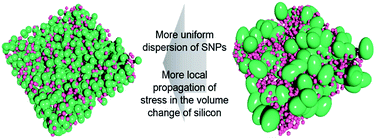Uniformly dispersed silicon nanoparticle/carbon nanosphere composites as highly stable lithium-ion battery electrodes†
Abstract
Engineered silicon and carbon composite materials have been demonstrated to be promising anode materials for lithium-ion batteries. In this paper, we demonstrate a facile approach to fabricating silicon/carbon composite electrodes via simple mixing of silicon nanoparticles (SNPs) and carbon nanospheres (CNSs). Size-monodisperse CNSs were obtained by the direct carbon conversion of polystyrene spheres. The mixture of SNPs with size-monodisperse CNSs allowed for a uniform dispersion with minimal SNP aggregation, which was evaluated through direct comparison of the SNP mixture with micrometer-sized carbon particles. This SNP/CNS composite electrode, containing 30 wt% SNPs, exhibited a reversible specific capacity of 1023 mA h g−1 at 100 mA g−1, which was more than three times higher than that of a bare CNS electrode. The capacity retention after 50 cycles was 73%, with a high Coulombic efficiency of 99%; in addition, the capacity retention was approximately 70% when the current density was increased tenfold. Specifically, the SNP/CNS electrode exhibited substantially less capacity fade than did SNPs dispersed in micrometer-sized carbon particles. Moreover, the SNP/CNS electrode exhibited improved capacity retention under high-current-density conditions compared to that of previously developed silicon/carbon composite anodes. We attributed this improved LIB performance to the uniform dispersion of SNPs in the CNS matrix, which resulted in stable SEI formation and effective accommodation of the volume change of silicon. We believe our CNS structures can be extended to other electrode-material systems that require a large volume change and good mass transport characteristics.


 Please wait while we load your content...
Please wait while we load your content...